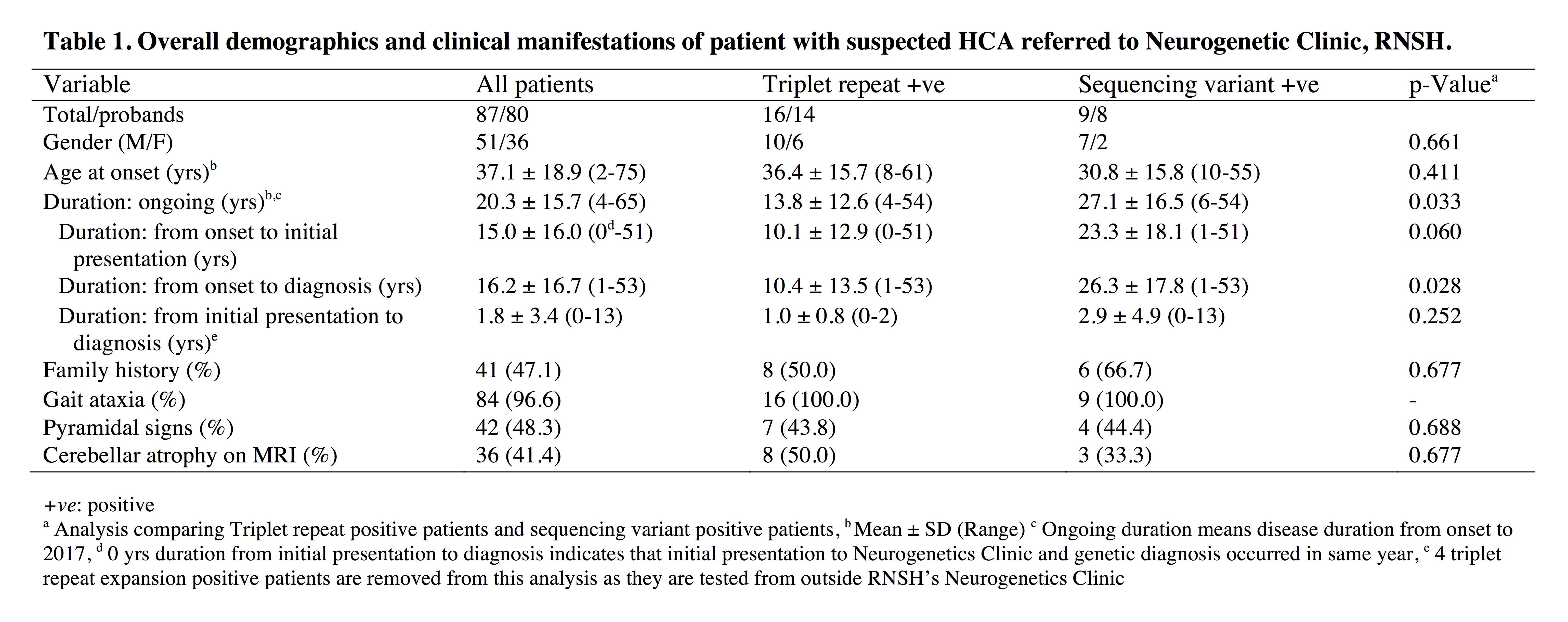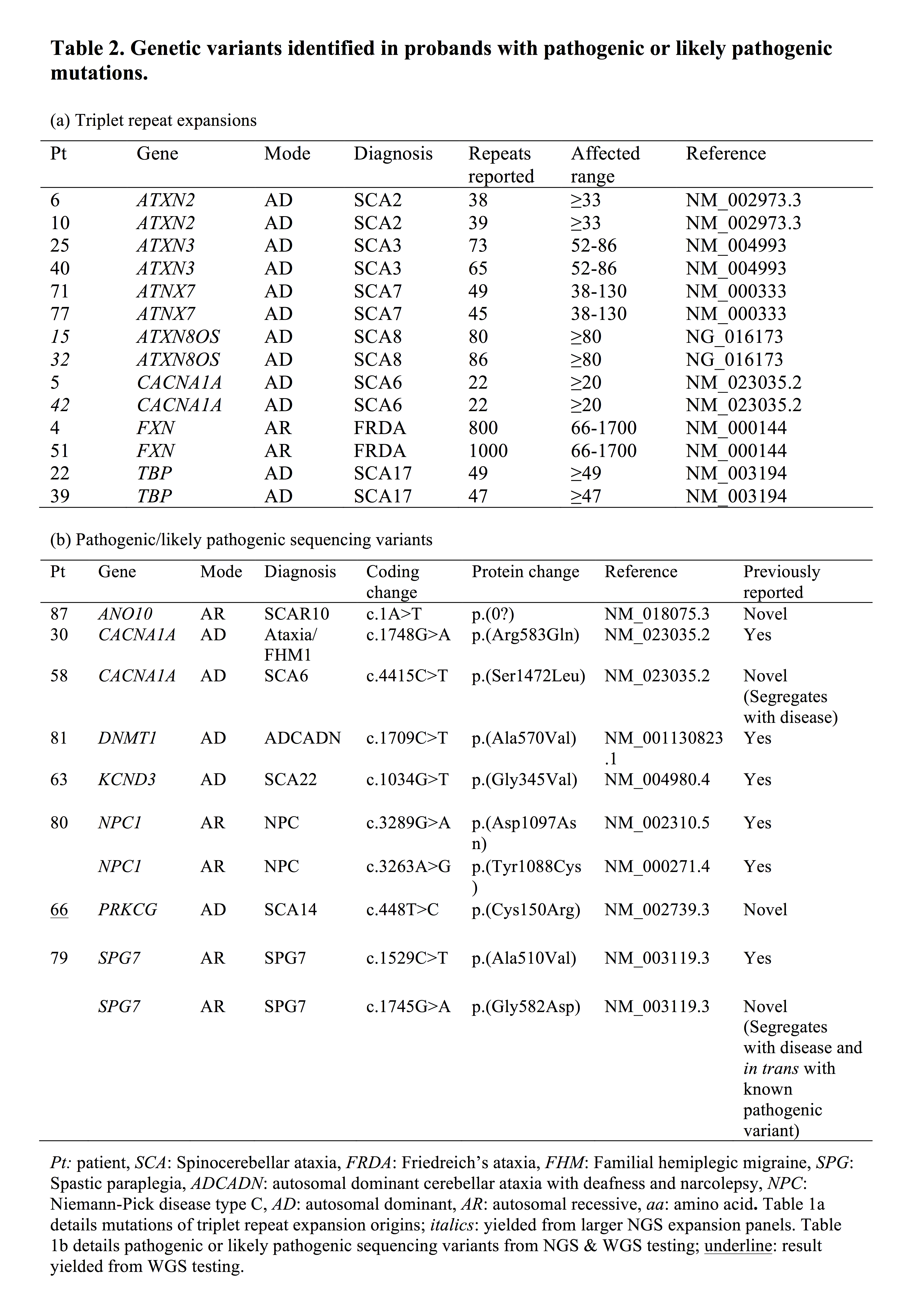Session Information
Date: Sunday, October 7, 2018
Session Title: Ataxia
Session Time: 1:45pm-3:15pm
Location: Hall 3FG
Objective: A retrospective review of the genetic spectrum in an Australian cohort of hereditary cerebellar ataxia (HCA), as well as evaluating HCA’s testing modalities at the Neurogenetics Clinic of Royal North Shore Hospital.
Background: HCA is a group of diseases that are challenging to diagnose due to its clinical and genetic variability. Newer genetic testing modalities had been implemented to aid HCA diagnosis. Techniques such as next generation sequencing (NGS) targeted panels and whole genome sequencing (WGS) are known to improve the diagnostic yield of rarer HCA variants. However, their impact on HCA’s genetic spectrum remains unclear.
Methods: 87 HCA affected individuals records were reviewed in order to assess genetic testing strategies. Testing modalities included triplet repeat expansion panels, NGS panels and WGS. Probands had triplet repeat expansion testing; those that tested negative had subsequent NGS targeted panels and WGS testing when available.
Results: In our cohort, 58.6% were male (51/87), average age at onset was 37.1 years (range 2-75), 66.7% were of adult onset. Of interest, the duration from onset to genetic diagnosis for sequencing variant positive individuals were averaging 26.3 years (range 1-53), which was significantly prolonged compared to triplet repeat positive individuals (averaging 10.4 years, range 1-53), with no significant difference in disease severity scales between these two groups. The detection rate in probands for triplet routine repeat expansion panels was 13.8% (11/80). NGS targeted panels yielded a further 10 patients (10/33, 30.3%), with WGS yielding 1 more diagnosis (1/3, 33.3%). NGS and WGS improved the overall diagnostic rate to 27.5% (22/80), with mutations occurring in 14 known HCA loci. We detected novel variants in ANO10 (SCAR10), CACNA1A (SCA6), and SPG7 (HSP7) via NGS panels. We also report identifying a novel variant in PRKCG (SCA14) detected by WGS analysis.
Conclusions: Our findings highlight the genetic heterogeneity of HCAs in Australia and support the use of subsequent NGS targeted panel for patients who were negative on repeat expansion testing. Furthermore, our results suggest that individuals with sequencing variants have a less rapid disease progression, which may be of prognostic value.
To cite this abstract in AMA style:
C. Kang, C. Liang, K. Ahmad, Y. Gu, SF. Siow, J. Colebatch, S. Whyte, K. Ng, P. Cremer, R. Davis, T. Roscioli, M. Cowley, J.S. Park, C. Sue, K. Kumar. Multi-tiered Diagnostic Approaches Reveal a High Degree of Genetic Heterogeneity for Hereditary Cerebellar Ataxias: A Retrospective Review of an Australian Cohort [abstract]. Mov Disord. 2018; 33 (suppl 2). https://www.mdsabstracts.org/abstract/multi-tiered-diagnostic-approaches-reveal-a-high-degree-of-genetic-heterogeneity-for-hereditary-cerebellar-ataxias-a-retrospective-review-of-an-australian-cohort/. Accessed February 8, 2026.« Back to 2018 International Congress
MDS Abstracts - https://www.mdsabstracts.org/abstract/multi-tiered-diagnostic-approaches-reveal-a-high-degree-of-genetic-heterogeneity-for-hereditary-cerebellar-ataxias-a-retrospective-review-of-an-australian-cohort/


